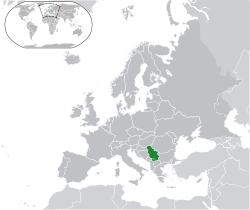Serbia Seeks ‘Entity’ Status For North Kosovo
By Vecernje Novosti
Belgrade says the Serb-run north of Kosovo should become an autonomous ‘entity’ along same lines as Republika Srpska in Bosnia, daily newspaper Vecernje Novosti reports.
Serbia’s long-awaited “platform” on Kosovo envisages the broadest possible autonomy for the mainly Serbian north of Kosovo, the Serbian daily, Vecernje Novosti, reported on Tuesday.

The newspaper says that the document, which has yet to be made public, says Northern Kosovo should be “some kind of entity, such as the Republika Srpska”.
According to 1995 Dayton Peace Accords, Bosnia is a sovereign state composed of two autonomous entities – the mainly Muslim and Croat Federation of Bosnia and Hercegovina, and the mainly Serbian Republika Srpska.
Northern Kosovo, which borders Serbia, is almost entirely comprised of Serbs, and the authorities there do not recognise Kosovo’s independence or the government in Pristina.
The area remains under the day-to-day control of so-called parallel institutions, funded by Belgrade, including town councils, health authorities, post offices and schools.
The platform adds that, referring to the constitution of Serbia, Belgrade will not recognize Kosovo as a state. So far, Kosovo has been recognized by 97 out of 193 UN member states including the US and 22 of the 27 EU member states.
Vecernje Novosti said that the platform would form a subject of discussion with the international community.
The document has been signed off by all Serbia’s top officials who met in Belgrade late on Sunday.
No details have been released about what the state policy on Kosovo further entails. The Prime Minister, Ivica Dacic, said only after the meeting that all senior officials had agreed on a unified policy.
The emergence of the platform comes after Kosovo and Serbia leaders made a breakthrough deal in Brussels on December 4 on implementation of a deal on the border.
Known as “integrated border management, IBM, it involves each side appointing its own liaison officers to monitor its workings.
In the meantime, President Tomislav Nikolic met on Monday with the ambassadors of Russia, China and Britain to inform them of Serbia’s progress in building a strategy on Kosovo.
Nikolic is expected to meet parliamentary whips in the second half of next week to present the long-awaited platform, Tanjug news agency has reported.
